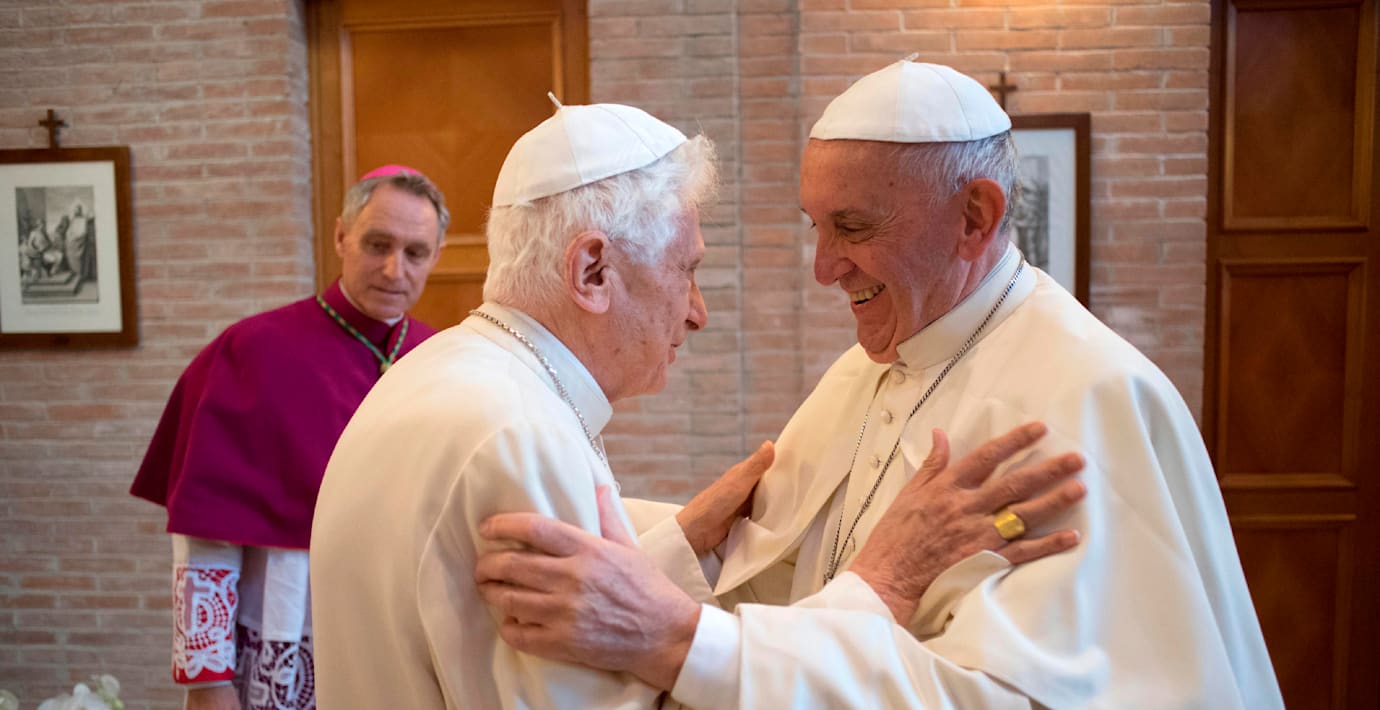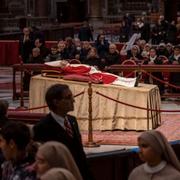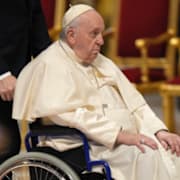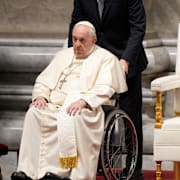
Påven om sin företrädare: En nobel och vänlig man
Påve Franciskus har gjort sitt första uttalande efter föregångaren Benedictus XVI:s död, skriver AFP.
Vid en nyårsmässa i Peterskyrkan kallar Franciskus föregångaren för ”en så nobel och så vänlig” man, och uttryckte tacksamhet ”för allt gott han gjort” och ”de uppoffringar han gjort för kyrkans bästa”.
Han tillägger att Benedictus var ”en gåva för kyrkan”.
Påve Benedictus, som 2013 blev den förste påven på 600 år att abdikera, dog tidigare på lördagen vid 95 års ålder.
bakgrund
Påve Benediktus XVI
Wikipedia (en)
Pope Benedict XVI (Latin: Benedictus XVI; Italian: Benedetto XVI; German: Benedikt XVI.; born Joseph Aloisius Ratzinger, German: [ˈjoːzɛf ʔaˈlɔʏzi̯ʊs ˈʁatsɪŋɐ]; 16 April 1927 – 31 December 2022) was the head of the Catholic Church and sovereign of the Vatican City State from 19 April 2005 until his resignation on 28 February 2013. Benedict's election as pope occurred in the 2005 papal conclave that followed the death of Pope John Paul II. Benedict chose to be known by the title "pope emeritus" upon his resignation.Ordained as a priest in 1951 in his native Bavaria, Ratzinger embarked on an academic career and established himself as a highly regarded theologian by the late 1950s. He was appointed a full professor in 1958 at the age of 31. After a long career as a professor of theology at several German universities, he was appointed Archbishop of Munich and Freising and created a cardinal by Pope Paul VI in 1977, an unusual promotion for someone with little pastoral experience. In 1981, he was appointed Prefect of the Congregation for the Doctrine of the Faith, one of the most important dicasteries of the Roman Curia. From 2002 until his election as pope, he was also Dean of the College of Cardinals. Prior to becoming pope, he was "a major figure on the Vatican stage for a quarter of a century"; he had an influence "second to none when it came to setting church priorities and directions" as one of John Paul II's closest confidants. He lived in Rome from 1981 until his death in 2022.
His writings generally defended traditional Catholic doctrine, values and liturgy, and were prolific. He was originally a liberal theologian, but adopted conservative views after 1968. During his papacy, Benedict XVI advocated a return to fundamental Christian values to counter the increased secularisation of many Western countries. He viewed relativism's denial of objective truth, and the denial of moral truths in particular, as the central problem of the 21st century. He taught the importance of both the Catholic Church and an understanding of God's redemptive love. Benedict also revived a number of traditions, including elevating the Tridentine Mass. He strengthened the relationship between the Catholic Church and art, promoted the use of Latin, and reintroduced traditional papal vestments, for which reason he was called "the pope of aesthetics". He was described as "the main intellectual force in the Church" since the mid-1980s.On 11 February 2013, Benedict announced his resignation, citing a "lack of strength of mind and body" due to his advanced age. His resignation was the first by a pope since Gregory XII in 1415, and the first on a pope's own initiative since Celestine V in 1294. He was succeeded by Francis on 13 March 2013, and moved into the newly renovated Mater Ecclesiae Monastery in Vatican City for his retirement.
In addition to his native German language, Benedict had some level of proficiency in French, Italian, English, and Spanish. He also knew Portuguese, Latin, Biblical Hebrew, and Biblical Greek. He was a member of several social-science academies, such as the French Académie des Sciences Morales et Politiques. He played the piano and had a preference for Mozart and Bach.
Omni är politiskt obundna och oberoende. Vi strävar efter att ge fler perspektiv på nyheterna. Har du frågor eller synpunkter kring vår rapportering? Kontakta redaktionen



